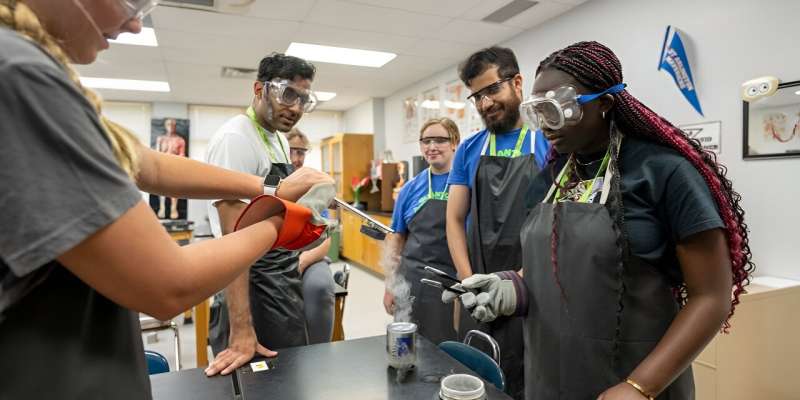This article has been reviewed according to Science X's editorial process and policies. Editors have highlighted the following attributes while ensuring the content's credibility:
fact-checked
trusted source
proofread
Study shows online professional education works for complex topics

Online education is effective for teaching complicated topics like quantum information science (QIS) to high school science educators, according to a new paper by University of Texas at Arlington researchers published in The Physics Teacher.
"COVID-19 forced educators to adjust their educational best practices to an unfamiliar virtual classroom, and professional development was no different," said Karen Jo Matsler, assistant professor in practice for UTeach at UTA and lead author on the study.
Ramon Lopez, professor of physics, was coprincipal investigator on the project. Chandralekha Singh from the University of Pittsburgh was a co-author.
QIS is a new field of science and technology that combines physical science, math, computer science and engineering, and it is key to everyday items like cellphones and solar technology. However, most high schools don't teach the subject, preventing students from acquiring the skills they need to pursue lucrative jobs.
As part of a $1 million grant from the National Science Foundation in 2021, Matsler and her colleagues aimed to teach QIS to high school science teachers, who could then bring this newly acquired knowledge to their classrooms.
"However, the pandemic made us scrap our original plans for in-person training to an online environment," Matsler said. "We knew that teaching QIS online would be challenging, but we were pleasantly surprised how well it worked."
Matsler, Lopez and the team found that what worked best for teaching QIS online was sending participants some of the material in advance to allow them to become familiar with the topics. Then during the sessions, the educators used Zoom—with features such as chat, polling and breakout rooms—to keep the individuals engaged in learning. They also led activities where the learners had a chance to practice teaching the material, another technique that helped individuals stay engaged.
To avoid cognitive overload, the team found main discussions needed to be kept at 15 to 30 minutes, each with breakout sessions lasting five to seven minutes, with a total session time of about 90 to 120 minutes.
"This gave participants ample opportunities to discuss the quantum concepts in small groups varying from two to six participants," Matsler said. "During these small discussions, leaders rotated in and out of the rooms to check on the participants, clarify instructions and answer questions."
The instructors also recommend "icebreaker" activities to increase community engagement in virtual learning.
"These icebreaker activities can easily be used to engage students, take attendance and gauge how much the individuals know about the upcoming subject lesson," Matsler said. "A key element to all of this online learning is making sure the learners feel they are in a safe community to learn and exchange ideas."
The team also found that short, relevant videos helped teach complicated topics. They recommend keeping the chat function operational during videos to allow participants to ask questions and stay engaged.
"Ideally, QIS is taught in a classroom with hands-on activities to allow learners to see and touch how things like maglev trains and quantum levitation work," Matsler said.
"However, our experiences show that embedding appropriate pedagogy and content with online learning can be effective at teaching these topics. Understanding there is an effective virtual option is important as the country ramps up its efforts to accelerate quantum research and development to stay competitive with other countries in this field."
More information: Karen Jo Matsler et al, Applying Classroom Practices Learned from Virtual Professional Development During a Pandemic, The Physics Teacher (2024). DOI: 10.1119/5.0107084
Provided by University of Texas at Arlington





















